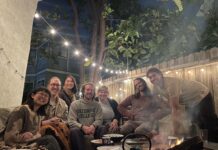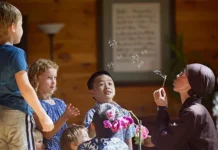This article, written by Denise Nguyen to help promote the Viet Wake Up event in Southern California this past Spring 2014, was aimed at Vietnamese young adults who may have been turned off by Buddhism because of how they’ve learned or didn’t learn about its deep teachings from their parents. It was published in English by “Nguoi Viet”, the oldest and largest Vietnamese newspaper in the United States.
Back in the late 1980s, General Motors ran an ad for their now defunct Oldsmobile Cutlass line stating, “This is not your father’s Oldsmobile.” The marketing campaign, meant to appeal to a younger demographic, declared it was a new generation of Oldsmobiles.
My first car was a silver blue Cutlass Supreme, which ironically was my father’s Oldsmobile, having inherited it from my parents after they bought a Toyota. As a teenager in a school where many of the other kids in the playground drove Hondas or BMWs, I was stuck with the Olds. Not cool Dad. Never mind Oldsmobile was America’s third most popular brand and one of the oldest car lines in the world at that point. Never mind I was very fortunate to even have a car at that age.
Such are the woes of young adult years. We rebel and declare un-cool what our parents espouse. We roll our eyes and turn our backs on what they may like, deeming it not fit for our taste or time.
Having grown up a default Buddhist, I remember having similar views about Buddhism. Perhaps many of you can relate to being dragged to temples as a kid, many of them with their familiar sloping roofs and upturned corners. I was taught to hold the incense sticks and bow three times in front of the Buddha statue. Not being fluent in Vietnamese, I remember not understanding the meaning behind the chants or bowing, nor having its deep teaching explained to me. So I sat in the corner daydreaming until lunchtime arrived with the vegetarian meals, the delicious highlight of the day. Needless to say, an outing to the Buddhist temple wasn’t an experience I eagerly awaited.
At home, we had the traditional family altar with a statue of a serene Buddha and portraits of beloved family members who had passed away. But did we practice mindfulness, a key teaching in Buddhism, back when I was a young teen? Well, to quote another popular advertising slogan: What happened at the temple stayed at the temple. This was the Buddhism I knew, a default one I inherited from many generations. And I imagine what happened to me back in the 1980s might be a familiar experience even now for today’s youths, except they have iPhones to keep them preoccupied in the corner of the temple.
My parents dragged me to the temple as a kid. It wasn’t an experience I eagerly awaited.
But if you haven’t noticed, the terms “mindfulness” and “meditation” have been popping up more often in mainstream society, in magazines, television, social media, and conversations. In January 2014, the cover of Time magazine stated we are in the midst of a mindfulness revolution, with an in-depth article about the science of finding focus in a stressed-out, multitasking culture.
So what is mindfulness and why is it being widely embraced by people today, regardless of their religion? Mindfulness is a secular way of being. It’s practicing to be aware and present in the moment, not only of what’s going on around you but also what’s going on inside of you. Take a situation where a family member, for instance, says something that irritates you. Mindfulness is first being aware of irritation arising in you. Many times we feel that anger shoot straight to the top of our heads, erupting like a volcano from our bodies. Then in autopilot mode, out of years of habit, we react. We say something mean or condescending or even far worse, we hit our spouse. Mindfulness is also, while now being aware of the feeling of anger, we take a moment to take a breath, or two, or ten, to calm down. And then we reflect more deeply. Why did this irritate me? Did this person even intend to anger me or did I misperceive the situation? We have a choice in every moment to continue the habit energies of our past, which may persist miscommunication, misperceptions and mistrust, or we can make a change and react differently, one with more compassion and understanding. Mindfulness is more than just stress relief; it’s a profound practice that with regular attention can lead to more focus, insight, wisdom, and peace.
We are in the midst of a mindfulness revolution.
And mindfulness is manifesting in different and interesting ways in today’s society. It’s Harpo, Oprah Winfrey’s company, encouraging and allowing employees to meditate ten minutes a day, twice a day. It’s an increase in people eating vegetarian or vegan meals out of compassion for animals and our precarious environment. Last month, I went to Wisdom 2.0, a conference on mindfulness, compassion and wisdom, attended by 2,000 people from businesses and technology companies such as Facebook, Google, Twitter, and LinkedIn. These organizations, recognizing many of their employees are stressed, burnt out, and imbalanced, want to integrate mindfulness practices into their workplace culture. Which celebrities take time throughout their day to practice being still, focusing on their breath, and calming their minds? Katy Perry, Hugh Jackman, Ellen Degeneres, Gisele Bundchen, Derek Jeter, and Jerry Seinfeld, to name a few. And is it just a coincidence the Seattle Seahawks espoused meditation sessions are equally important as lifting weights to game day success on their journey to a Super Bowl championship?
The world of science has taken notice as well. We need to take meditation more seriously as medicine, the article in Time magazine declared, quoting a recent study in the Journal of the American Medical Association (JAMA) Internal Medicine that found meditation can benefit people suffering from depression, anxiety, and pain. Well that covers about most people I know who regularly experience those feelings.
Dr. Larry Rosen, a research psychologist and author of the book The Distracted Mind, compellingly presented at Wisdom 2.0 how studies show technology contributes to multitasking, which contributes to students unable to deeply concentrate on their studies, which is linked to lower grades. What was one of his suggestions for helping students calm their brains? Mindful meditation. It’s not only students who can benefit. How many of us in the workplace are listening on a conference call, reading emails, replying to a coworker’s question on instant message, and eating lunch at our desk at the same time? The myth of multitasking says we are more productive. What we are is over stimulated, unable to focus, sleep deprived, and just plain tired.
Many businesses recognize their employees are stressed and burnt out.
And within our own community, I’ve learned of Vietnamese young adults recently in Toronto, Houston, Seattle, San Jose and upcoming at Los Angeles on Saturday, April 5th at the University of Southern California, who want to gather and learn mindfulness skills that can benefit them in school, work, relationships, and life in general. They want to renew their roots, both spiritually and ancestrally. They’ve realized to create a happy, healthy and compassionate society, they need to start with themselves.
So this is perhaps not how you viewed or experienced Buddhism from your parents. But it is Buddhism, benefiting your parents yet also evolving to benefit a younger generation as well. Mindfulness is one revolution I’m happy to be a part of.

















This is beautiful, Denise! Thank you for bridging generations so poetically and relevantly.